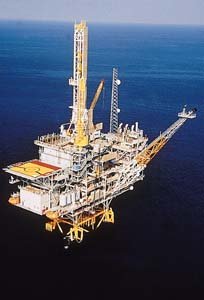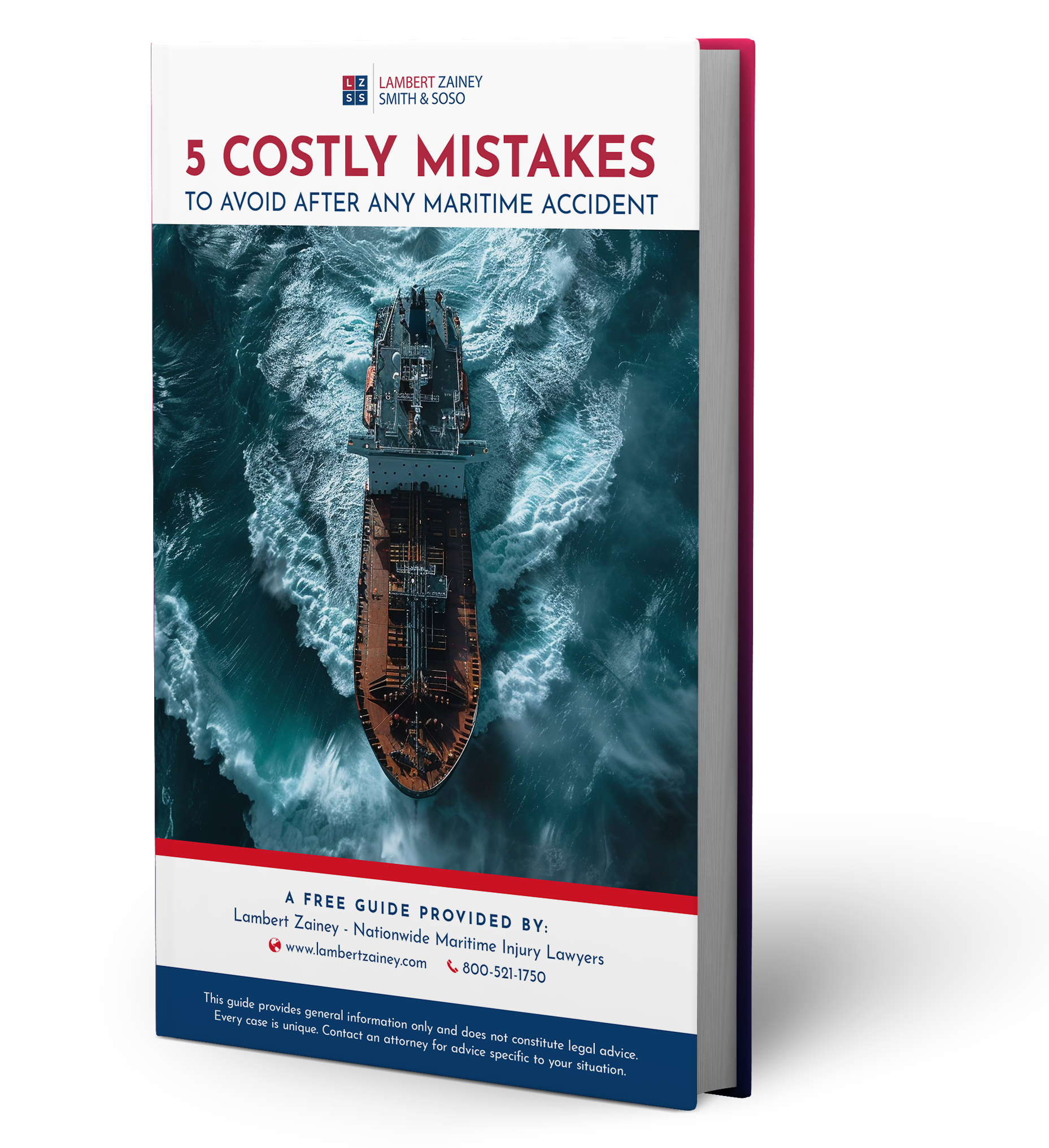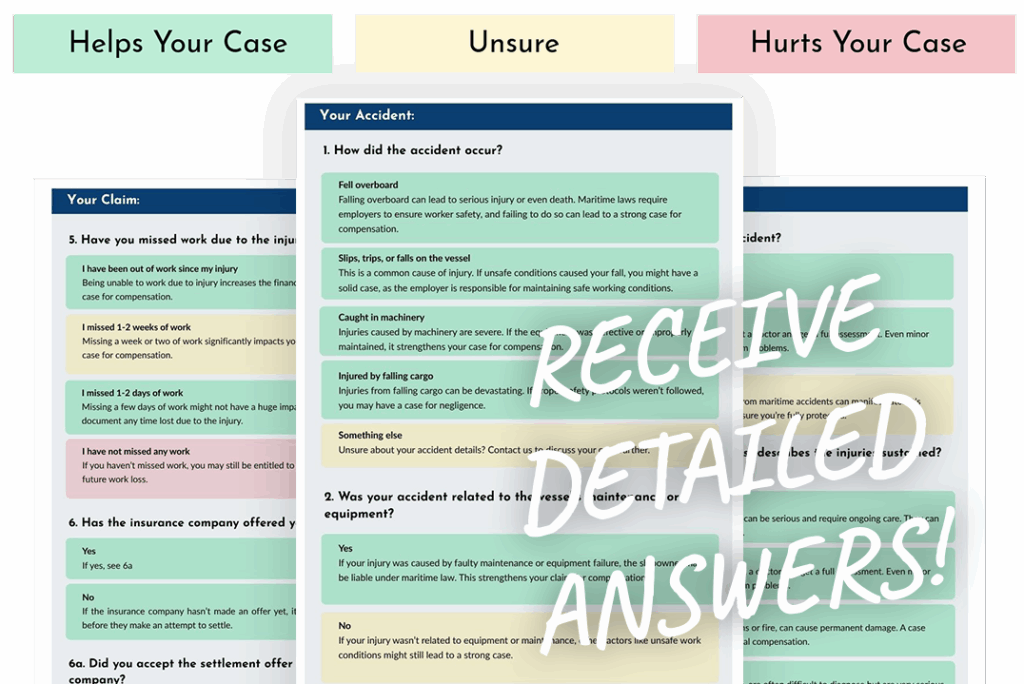Whether a maritime worker is a member of a crew on a vessel, working on a platform or other offshore facility, or working as a longshoreman, he or she likely encounters dangerous working conditions on a daily basis. The nature of maritime work is inherently risky, and some of the most common offshore injuries can be severe, even life-threatening. The risks of suffering offshore injuries is greatly increased when employers and other workers are negligent in their duties.
Unfortunately, catastrophic, life-changing events are a reality for maritime workers, especially Jones Act Seamen. These events are often the result of a vessel owner’s negligence and/or an unseaworthy condition on a vessel. When these events occur, vessel owners will try to limit their liability by seeking protection under the Limitation of Liability Act.

The Limitation of Shipowner’s Liability Act was enacted in 1851 and in certain circumstances, allows a a shipowner to limit liability for loss or damages to the value of the vessel post-voyage. Although the Act has been highly criticized for being outdated, it remains in effect today.
What is the Shipowner’s Limitation of Liability Act of 1851?
The Limitation of Liability Act of 1851 allows a vessel owner to limit liability to the post-voyage value of the vessel when loss or damages were incurred without the owner’s “privity or knowledge.” Sometimes a vessel is completely destroyed during an event, and the value of the vessel “post-loss” is nothing. Consequently, a maritime worker who has been injured or killed during a catastrophic event will not be compensated fairly. Vessel owners will attempt to assert a limitation defense or action where the vessel is worth very little post-accident and the maritime worker’s damages are high. Both personal injury claims and death claims (as well as several others) are subject to a Limitation defense or action.
For example, in 2010, three weeks after the Deepwater Horizon rig explosion, Transocean, the owner and operator of the mobile offshore drilling unit (MODU) invoked the Limitation of Liability Act to limit its liability to the remaining value of its drilling contract with BP, a figure substantially less than what the plaintiffs deserved.
The Limitation of Liability Act can be defeated under circumstances where it can be shown that the vessel owner had “privity and knowledge” of an unseaworthy condition, or where the owner participated in the negligent act causing the injury, or knew or should have known of the acts or omissions leading to the injury. It is extremely important for an injured maritime worker and/or the family of a deceased maritime worker to retain a knowledgeable and experienced maritime attorney to conduct a timely and thorough investigation into the cause(s) of the catastrophic event.
Get Our FREE Guide to Protect Your Claim
What you do after an accident is critical. Insurance companies will try to get you to make mistakes that can hurt your claim. Our free guide can help you avoid these traps.
Download our complimentary guide: “5 Costly Mistakes to Avoid After Any Maritime Accident” to arm yourself with the knowledge you need to protect your rights.
When Should I Hire a Maritime Lawyer?
In short, immediately. There are two ways in which a vessel owner may seek protection under the Limitation of Liability Act: (1) by bringing an action in federal court and (2) asserting protection as an affirmative defense. If the vessel owner chooses to bring an action in federal court, the injured worker will receive a notice of a Petition For Limitation and will only have a limited amount of time to answer. A maritime lawyer can help you answer the petition properly and on time and will work to defeat the action and make sure to protect your legal rights along the way.
The maritime lawyers at Lambert Zainey, PLC have over 30 years of experience handling maritime personal injury claims and know how to defeat a Limitation of Liability action or defense. If you or a loved one has been injured in a maritime accident, contact us today. We will make sure that you receive the compensation that you deserve.
Whether a maritime worker is a member of a crew on a vessel, working on a platform or other offshore facility, or working as a longshoreman, he or she likely encounters dangerous working conditions on a daily basis. The nature of maritime work is inherently risky, and some of the most common offshore injuries can be severe, even life-threatening. The risks of suffering offshore injuries is greatly increased when employers and other workers are negligent in their duties.
Unfortunately, catastrophic, life-changing events are a reality for maritime workers, especially Jones Act Seamen. These events are often the result of a vessel owner’s negligence and/or an unseaworthy condition on a vessel. When these events occur, vessel owners will try to limit their liability by seeking protection under the Limitation of Liability Act.

The Limitation of Shipowner’s Liability Act was enacted in 1851 and in certain circumstances, allows a a shipowner to limit liability for loss or damages to the value of the vessel post-voyage. Although the Act has been highly criticized for being outdated, it remains in effect today.
What is the Shipowner’s Limitation of Liability Act of 1851?
The Limitation of Liability Act of 1851 allows a vessel owner to limit liability to the post-voyage value of the vessel when loss or damages were incurred without the owner’s “privity or knowledge.” Sometimes a vessel is completely destroyed during an event, and the value of the vessel “post-loss” is nothing. Consequently, a maritime worker who has been injured or killed during a catastrophic event will not be compensated fairly. Vessel owners will attempt to assert a limitation defense or action where the vessel is worth very little post-accident and the maritime worker’s damages are high. Both personal injury claims and death claims (as well as several others) are subject to a Limitation defense or action.
For example, in 2010, three weeks after the Deepwater Horizon rig explosion, Transocean, the owner and operator of the mobile offshore drilling unit (MODU) invoked the Limitation of Liability Act to limit its liability to the remaining value of its drilling contract with BP, a figure substantially less than what the plaintiffs deserved.
The Limitation of Liability Act can be defeated under circumstances where it can be shown that the vessel owner had “privity and knowledge” of an unseaworthy condition, or where the owner participated in the negligent act causing the injury, or knew or should have known of the acts or omissions leading to the injury. It is extremely important for an injured maritime worker and/or the family of a deceased maritime worker to retain a knowledgeable and experienced maritime attorney to conduct a timely and thorough investigation into the cause(s) of the catastrophic event.
Get Our FREE Guide to Protect Your Claim
What you do after an accident is critical. Insurance companies will try to get you to make mistakes that can hurt your claim. Our free guide can help you avoid these traps.
Download our complimentary guide: “5 Costly Mistakes to Avoid After Any Maritime Accident” to arm yourself with the knowledge you need to protect your rights.
When Should I Hire a Maritime Lawyer?
In short, immediately. There are two ways in which a vessel owner may seek protection under the Limitation of Liability Act: (1) by bringing an action in federal court and (2) asserting protection as an affirmative defense. If the vessel owner chooses to bring an action in federal court, the injured worker will receive a notice of a Petition For Limitation and will only have a limited amount of time to answer. A maritime lawyer can help you answer the petition properly and on time and will work to defeat the action and make sure to protect your legal rights along the way.
The maritime lawyers at Lambert Zainey, PLC have over 30 years of experience handling maritime personal injury claims and know how to defeat a Limitation of Liability action or defense. If you or a loved one has been injured in a maritime accident, contact us today. We will make sure that you receive the compensation that you deserve.









